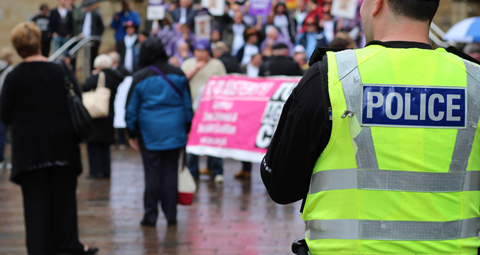BY Daniel Harkins | July 5 | ![]() 0 COMMENTS
0 COMMENTS ![]() print
print

Police Scotland concern over anti-sectarianism course criticising Catholic schools
Police Scotland has raised concerns that anti-sectarianism organisations are teaching that Catholic schools are 'ipso facto sectarian.'
The comments were made by Police Scotland’s Safer Communities, Equality and Diversity Unit in a response to a government consultation on hate crime.
The consultation considered whether or not to introduce a specific sectarianism ‘aggravation,’ that could be attached to hate crime charges.
Police response
Arguing against the introduction of such a measure, the police response said: “In our view, the suggested aggravation for sectarianism is likely to reduce clarity, transparency and consistency.
“At present there is no consistent understanding of what is encompassed by the term ‘sectarianism,’ and this can unintentionally mask what is meant, as similar language is used by different people to mean different things.”
‘Lack of clarity’
By way of example, the Police response added: “It may be helpful to draw attention to recent examples of the lack of clarity and consistency in the current understanding of what is encompassed by the term ‘sectarianism.’
“In 2018, separate training courses in ‘anti-sectarianism’ were run on multiple occasions by separate Scottish voluntary organisations.
“In their content or delivery, these courses treated the existence of Catholic schools as ipso facto sectarian, despite the clear guidance provided by Scottish Government’s advisory group on tackling sectarianism in Scotland, that ‘We do not believe that sectarianism stems from, or is the responsibility of, denominational schooling, or, specifically, Catholic schools, or that sectarianism would be eradicated by closing such institutions.’”
Church criticism
Anti-sectarianism groups have previously been criticised by the Church for positions on Catholic schooling. In 2011, the Church criticised Nil By Mouth for proposing ‘more shared campuses’ as part of a 13-point plan to tackle sectarianism in Scotland.
Barbara Coupar, director of the Scottish Catholic Education Service (SCES), said the ‘police concerns illustrate why the careful use of language, and a clear understanding of what we mean when we use certain terms is vitally important, particularly when relating to, and teaching young people about, sensitive and challenging topics.’
“The Church continues to welcome the guidance provided by the Scottish Government’s advisory group on tackling sectarianism in Scotland, when it clearly stated, ‘We do not believe that sectarianism stems from, or is the responsibility of, denominational schooling, or, specifically, Catholic schools, or that sectarianism would be eradicated by closing such institutions.’”
Concern
Mrs Coupar added: “The fact that training sessions about anti-sectarianism are still referring to Catholic schools in the content of the delivery is concerning.
“While we all may know that ‘sectarian’ literally means belonging to or associated with a sect, in everyday usage in Scotland it is understood as relating to hateful, divisive and unlawful actions.
“Using the word sectarian to describe Catholic schools, especially in anti-sectarian training sessions, hinders national progress in actually tackling the issue.”
Government analysis
The police response was revealed as an analysis by the Scottish Government of the hate crime consultation was published last week.
It found that ‘the overall balance of opinion was opposed to the introduction of legislation relating to sectarianism.’
The SCO previously reported that the Catholic Church opposed the introduction of a new sectarianism aggravation.
Its consultation response also stressed that freedom of belief and religion must be upheld by any proposals and stated that there is a ‘very real danger’ that expressing Catholic beliefs will become a hate crime amid a ‘present culture of heightened sensitivity.’










